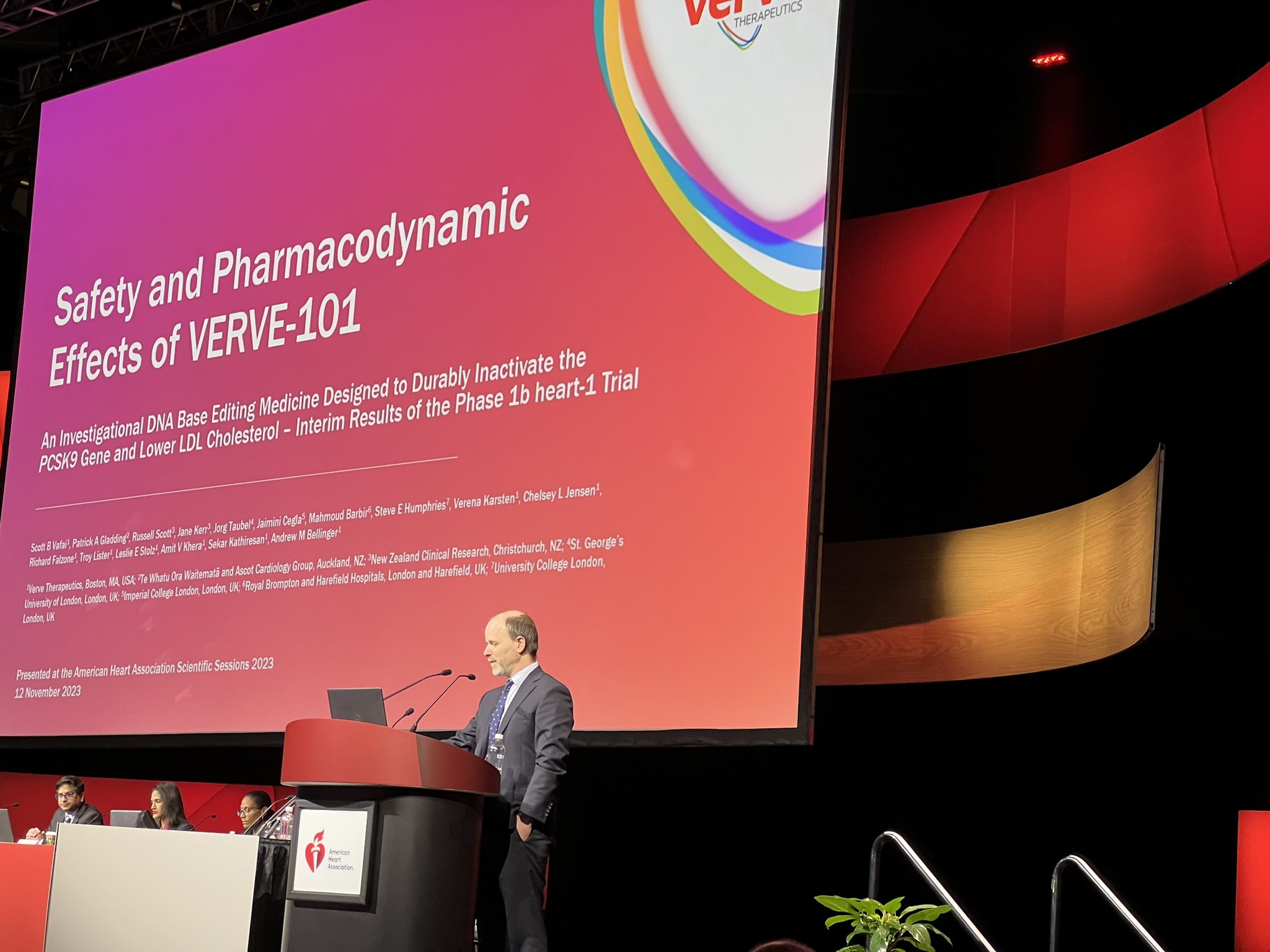A promising new gene-editing therapy targets heart attack and has shown significant promise in lowering dangerously high cholesterol levels in patients with familial hypercholesterolemia (FH).
FH is a genetic disorder that causes abnormally high levels of LDL-C, the “bad” cholesterol that can lead to heart disease, heart attack, or stroke. Despite the availability of various cholesterol-lowering medications, only a small percentage of FH patients achieve optimal LDL-C levels.
A recent interim report has revealed that a single infusion of this novel gene-editing therapy has effectively reduced LDL-C levels in FH patients. This breakthrough therapy holds immense potential for improving the lives of individuals with FH, particularly those with HeFH, the more severe form of the disorder.
The successful outcome of this interim report marks a significant step forward in the treatment of FH and offers hope for patients who have struggled to manage their cholesterol levels effectively. Further research and clinical trials are warranted to fully evaluate the long-term efficacy and safety of this promising gene-editing therapy.
Sure, here is a rephrased version of the text:
A novel gene-editing therapy called VERVE-101 has demonstrated remarkable potential in lowering LDL-C levels in patients with heterozygous familial hypercholesterolemia (HeFH), according to an interim report presented at the American Heart Association’s Scientific Sessions 2023. This groundbreaking therapy holds promise for transforming the lives of HeFH patients, offering a single-course treatment that could effectively manage their cholesterol levels for an extended period.
“Instead of relying on daily medications or repeated injections to lower bad cholesterol, this study suggests the possibility of a new treatment approach – a single-course therapy that could lead to substantial LDL-C reduction for decades,” remarked Dr. Andrew M. Bellinger, M.D., Ph.D., Chief Scientific Officer at Verve Therapeutics in Boston, in a statement.
This interim report highlights the transformative potential of VERVE-101 in treating HeFH and offers a glimmer of hope for patients who have long struggled to manage their cholesterol levels effectively. Further research and clinical trials are necessary to fully evaluate the long-term efficacy and safety of this promising gene-editing therapy.
Targeted Gene-Editing Therapy Effectively Lowers Bad Cholesterol in HeFH Patients by upto 55%

A novel gene-editing therapy, VERVE-101, has demonstrated remarkable efficacy in lowering LDL-C levels in patients with heterozygous familial hypercholesterolemia (HeFH), achieving a significant reduction of up to 55% in LDL-C levels.
VERVE-101 utilizes CRISPR technology to permanently disable the PCSK9 gene in the liver. This gene plays a crucial role in regulating LDL-C levels by controlling LDL receptors.
The initial human trial of VERVE-101 involved nine individuals, with an average age of 54 years. Eight participants were of Caucasian descent, and one was of Asian ethnicity. All participants were diagnosed with HeFH and had exceptionally high LDL-C levels, averaging 201 mg/dL.
For individuals without heart disease, optimal LDL-C levels are below 100 mg/dL. For those with heart disease, the recommended levels are below 70 mg/dL, and for HeFH patients with severe heart disease, the target levels are as low as 55 mg/dL.
All study participants were already receiving the maximum-tolerated LDL cholesterol-lowering medication. Additionally, most participants had a history of severe coronary artery disease, including heart attacks, coronary bypass surgery, or stenting procedures.
Each participant received a single intravenous infusion of VERVE-101. The first group received a low dose of 0.1 mg/kg, while the remaining groups received escalating doses, with the highest dose being 0.6 mg/kg.
In two participants who received 0.45 mg/kg of the drug, LDL-C levels were reduced by 39% and 48%. The single participant who received the highest dose of 0.6 mg/kg experienced a 55% decrease in bad cholesterol levels.
The therapy also led to significant reductions in blood PCSK9 protein levels. Participants receiving the 0.45 mg/kg or 0.6 mg/kg doses showed PCSK9 reductions of 47%, 59%, and 84%, respectively. The participant who received the highest dose of 0.6 mg/kg also maintained reduced LDL-C levels at six months, with follow-up ongoing.
These findings suggest that VERVE-101 has the potential to be a safe and effective single-course treatment for HeFH patients. Further research is warranted to fully evaluate the long-term efficacy and safety of this promising gene-editing therapy.
Symptoms of familial hypercholesterolemia
Familial hypercholesterolemia (FH) is an inherited genetic disorder that causes dangerously high levels of low-density lipoprotein (LDL) cholesterol. Adults with FH typically have LDL cholesterol levels exceeding 190 mg/dL, while children with the condition often have LDL cholesterol levels above 160 mg/dL.
FH can manifest in several physical signs, including:
Fatty deposits (xanthomas) around the knees, knuckles, or elbows
Swelling or pain in the Achilles tendon
Yellowish deposits (xanthelasmas) around the eyes
A whitish-gray ring (arcus cornealis) around the cornea
Furthermore, a family history of early heart disease or heart attack is common among individuals with FH.
If the novel gene-editing therapy VERVE-101 proves to be safe and effective, a single dose could potentially provide long-lasting benefits, extending for decades. This breakthrough therapy holds immense promise for improving the lives of FH patients, particularly those with HeFH, the more severe form of the disorder.
Key takeaways:
VERVE-101 uses CRISPR technology to permanently turn off the PCSK9 gene in the liver, which plays a critical role in regulating LDL-C levels.
In an interim report, VERVE-101 demonstrated remarkable efficacy in lowering LDL-C levels by up to 55% in patients with HeFH.
The therapy also led to significant reductions in blood PCSK9 protein levels and maintained reduced LDL-C levels at six months in one patient.
These findings suggest that VERVE-101 has the potential to be a safe and effective single-course treatment for HeFH patients.
Gene therapy involves introducing genetic material into cells to correct or replace faulty genes, potentially modifying disease-causing pathways.
Gene therapy research for cardiovascular diseases focuses on lowering LDL cholesterol levels, improving blood vessel function, and reducing inflammation.
Early clinical trials of gene therapy have shown promising results in reducing cholesterol levels and improving cardiovascular outcomes.
While further research is needed to evaluate the long-term safety and efficacy of gene therapy, it holds immense potential for revolutionizing cardiovascular disease prevention and treatment.
Potential Benefits of Gene Therapy for Cardiovascular Diseases:
Targeted treatment for specific genetic defects that contribute to cardiovascular disease.
Long-lasting effects from a single gene therapy treatment.
Reduced reliance on lifelong medications or invasive procedures.
Improved quality of life and reduced healthcare costs associated with cardiovascular diseases.
Future Directions of Gene Therapy for Cardiovascular Diseases:
Continued development of gene-editing technologies for enhanced precision and safety.
Expansion of gene therapy clinical trials to evaluate its efficacy in various cardiovascular disease populations.
Exploration of gene therapy’s potential to treat other cardiovascular conditions, such as heart failure and arrhythmias.
Gene therapy offers a promising avenue for early intervention and prevention of cardiovascular diseases, with the potential to significantly improve patient outcomes and reduce the burden of cardiovascular disease on individuals and healthcare systems.










